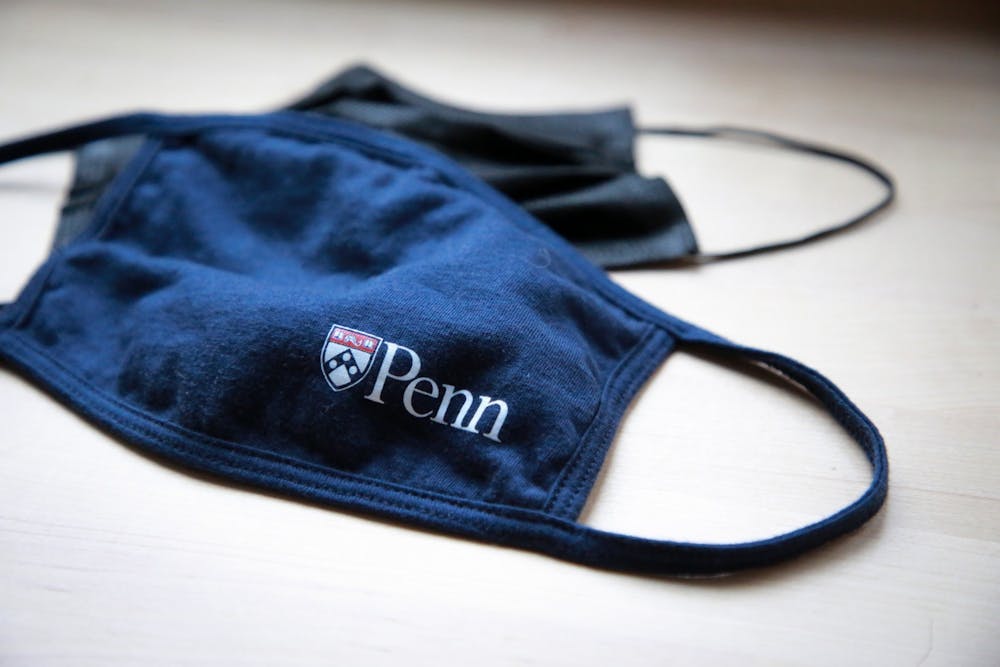
Penn has once again dropped its indoor mask mandate for all non-classroom indoor spaces, following revised guidance from the City of Philadelphia.
The change in COVID-19 masking policy came five days after Penn and the City of Philadelphia began enforcing an indoor mask mandate for public spaces, becoming the first major city in the country to do so.
An April 22 email to the Penn community by top University administrators — Interim President Wendell Pritchett, Interim Provost Bath Winkelstein, Senior Executive Vice President Craig Carnaroli, and Executive Vice President for the Health System J. Larry Jameson — cited revised guidance from the Philadelphia Department of Public Health as the reason for reversing the indoor mask mandate.
Masks will continue to be required in classrooms, health care spaces, and on Penn Transit, the email wrote.
Penn has also shifted its public health response level from Level 2: "Awareness" to Level 1: "Baseline Mitigation Strategies," which keeps its basic protective strategies but lifts the indoor mask mandate for most indoor spaces.
Despite the transition away from a mask requirement, the campuswide COVID-19 case count has reached the highest number of positive tests in 13 weeks, with a total of 801 community members testing positive during the week from April 10 to April 16.
“The onus is really on personal risk assessment,” Chief Wellness Officer Benoit Dubé told The Daily Pennsylvanian. “That’s why we pivoted from alert levels to levels of protective measures, reinforcing people’s agency in this process, and not simply asking, ‘What is Penn doing to protect me?’ but rather reminding people, ‘What can I do to protect myself?’”
In addition to dropping the indoor mask mandate, the Philadelphia Department of Public Health also eliminated its response tier system. Since February, Philadelphia had been using key metrics — case count, the citywide tally of hospitalizations, and the rate at which cases were rising — to determine the extent of COVID-19 precautions, and to regulate the move from one response tier to another.
Health Commissioner Cheryl Bettigole said in a Friday morning press conference that recent data showing hospitalization counts decreasing and case counts increasing made the tiered system — and the city’s mask mandate — obsolete. In terms of redesigning the tier-based system, Bettigole confirmed that the concept itself is being abandoned.
“The idea of building a different system on updated metrics doesn’t really make a lot of sense,” Bettigole said, adding that the “practical effect” of abolishing the response tier system frees the city from being forced to impose stricter mitigation strategies when it might not be necessary.
Bettigole said that in moving away from the “triggers,” the Philadelphia Department of Public Health is effectively moving toward ensuring Philadelphians have solid information and the resources needed to protect themselves, adding that people respond well to “loud and clear information.”
“Philadelphians didn’t wait for enforcement to be careful,” Bettigole said. “I think that’s very encouraging.”
Despite the short-lived mask mandate, Bettigole said that improving trends in Philadelphia — despite rising cases and hospitalizations in some nearby counties and states — were proof that the guidance had worked.
After a federal court ruling blocked a national mask mandate on airplanes and mass transit systems on April 18, the nation’s largest airline and train companies made masking optional for customers. Philadelphia International Airport, notably, remained one of only airports to require masks, but following revised guidance from the City, it announced a reversal in its mask requirements in a press release on April 22.
"We thank you for your continuing patience and partnership, and we look forward to seeing you at our many joyful campus celebrations in the weeks ahead," Penn administrators wrote in the email.
The Daily Pennsylvanian is an independent, student-run newspaper. Please consider making a donation to support the coverage that shapes the University. Your generosity ensures a future of strong journalism at Penn.
Donate




